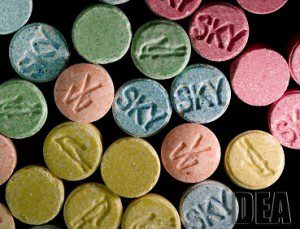High school seniors who are most likely to take Ecstasy are those who use other drugs, researchers at New York University have found.
Overall, about 4.4 percent of high school seniors reported using Ecstasy within the last year, Newswise reports. Males are at particularly high risk for use. The drug is also known as “Molly,” “E” and “X,” the article notes. It has become popular at dance parties.
The findings, published in Substance Use & Misuse, are based on data from the Monitoring the Future nationwide annual study. About 15,000 high school seniors are included in the study each year. The study did not specifically ask about Molly. Since many teens may not realize Molly is another name for Ecstasy, more of them may be using the drug than the study indicates, the researchers noted.
Other risk factors for teen Ecstasy use included having a weekly income of more than $50 from a job, or more than $10 weekly from other sources. Students living in cities were at increased risk, as were teens who had used alcohol, cigarettes, marijuana or other illegal drugs.
“Ecstasy use also tends to precede use of other club drugs so preventing Ecstasy use (e.g., among those who attend nightclubs and parties) may also prevent initiation and use of drugs such as ketamine (‘Special K’) and GHB,” lead researcher Joseph J. Palamar, PhD, MPH, said in a news release.
“Hundreds of new designer drugs have emerged in recent years, some of which were created to mimic the effects of Ecstasy,” Dr. Palamar said. “Many individuals may be ingesting what they think is Ecstasy, but it may in fact be an even more dangerous new substance. Likewise, today Ecstasy commonly comes in powder form instead of pill form, which may even further increase the chances of receiving the drug cut with additional designer substances.”
Published
June 2014
 Get Support
Get Support

